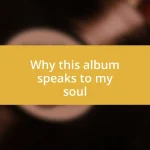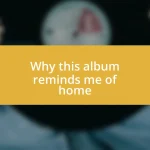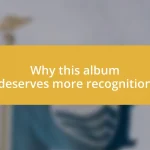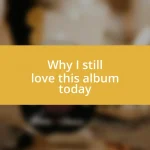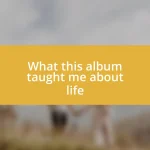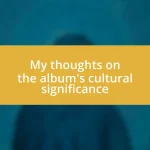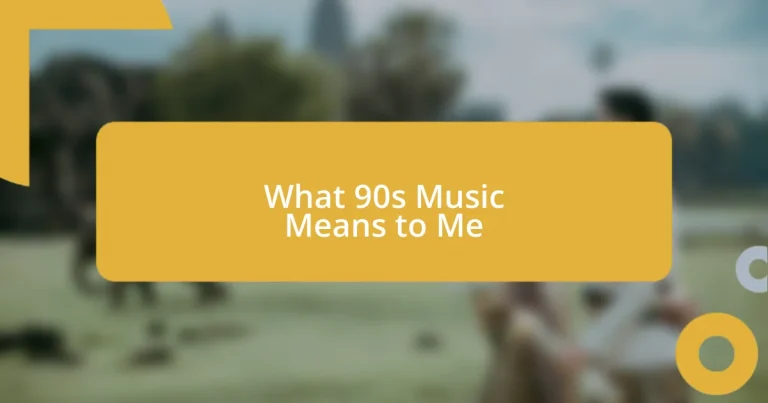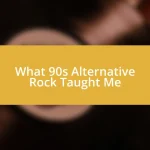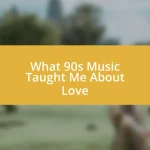Key takeaways:
- The 90s music landscape, characterized by grunge, hip-hop, R&B, and pop, profoundly shaped cultural identity and personal experiences, offering raw emotions and a sense of belonging.
- Iconic artists like Nirvana, TLC, and Alanis Morissette influenced listeners by articulating feelings of youth, empowerment, and vulnerability, creating connections that transcended music.
- The cultural significance of 90s music fostered movements of authenticity and self-expression, empowering listeners, particularly women, and encouraging them to embrace their identity and individuality.
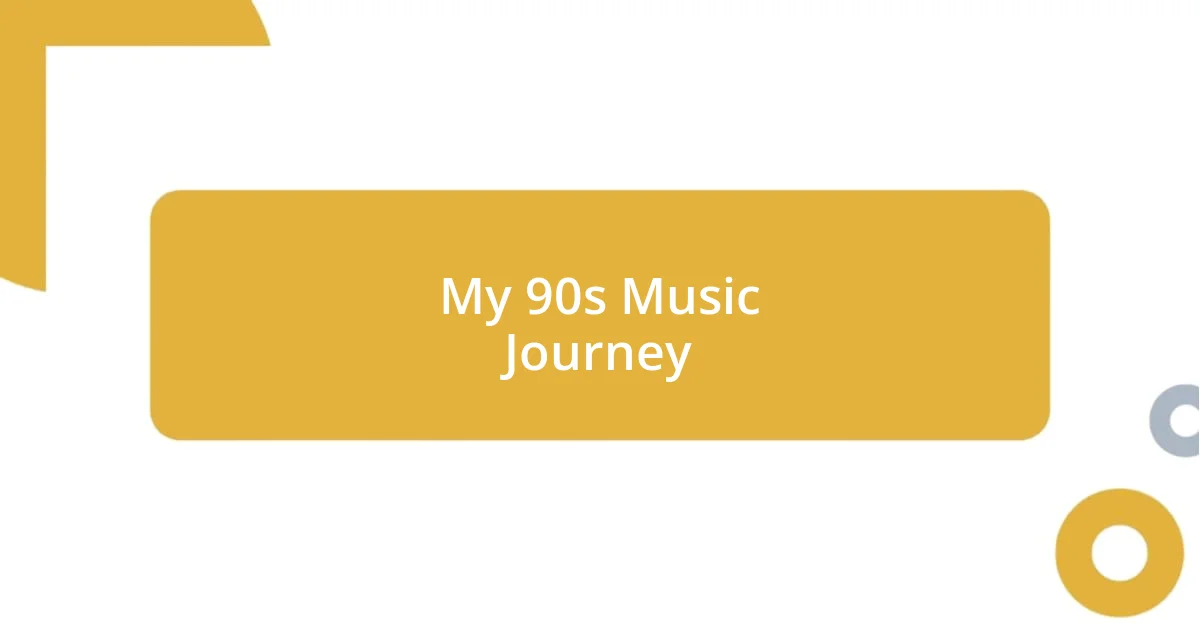
My 90s Music Journey
Growing up in the 90s, my music journey felt like a rite of passage. I vividly remember the first time I heard Nirvana’s “Smells Like Teen Spirit.” It was not just a song; it was an awakening. Can you recall a moment when a single track shifted your perspective? That was my moment, and it made me crave more of that raw, emotional sound.
As I made mixtapes filled with hits from bands like TLC and Pearl Jam, each song captured a snapshot of my life. I would play them on repeat, feeling an unspoken connection to the lyrics. Whether it was dancing around my bedroom or getting lost in my thoughts during a long drive, those songs truly shaped who I was. Isn’t it fascinating how music can encapsulate our feelings, transporting us back to specific memories?
I also remember weekends spent chilling with friends, sharing our latest album finds. Relying on the radio to discover new music felt so organic. It was a time when you had to listen closely, hoping to catch your favorite song. That tangible excitement still lingers in my mind. How has music discovery changed for you over the years? For me, it was a journey of developing my taste and identity, forever intertwined with the exhilarating notes of the 90s.
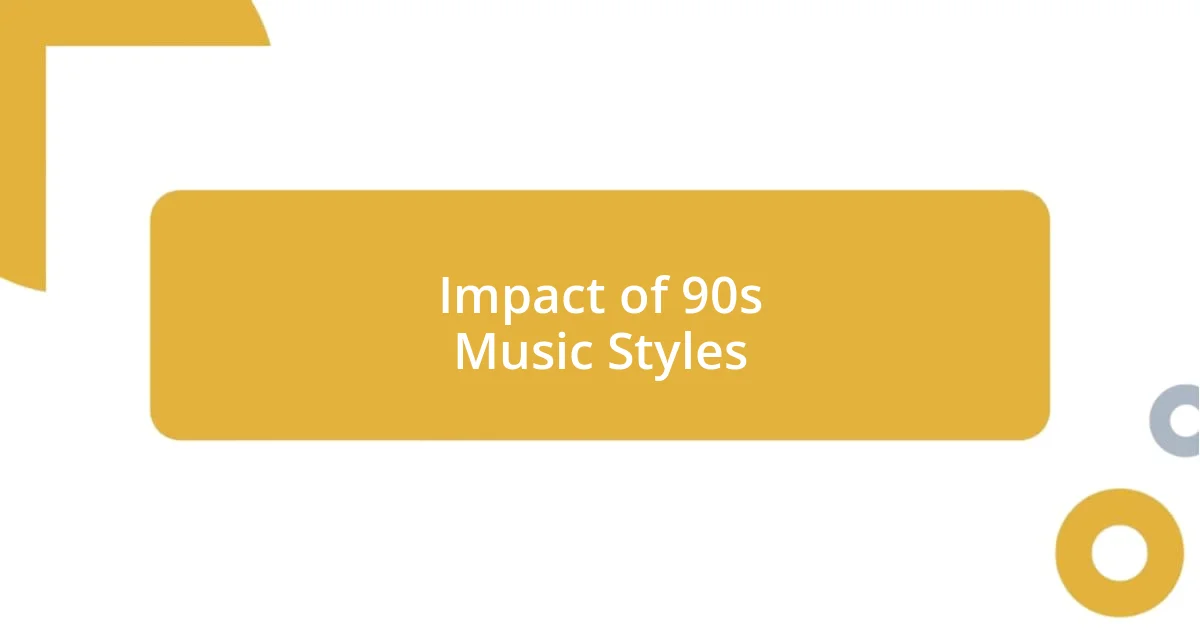
Impact of 90s Music Styles
The impact of 90s music styles stretches far beyond just catchy hooks and memorable lyrics; it shaped a generation’s identity and sense of belonging. I remember listening to hip-hop artists like Tupac and Notorious B.I.G. for the first time; their stories resonated with me deeply. The beats and narratives provided a soundtrack to our cultural backdrop, giving voice to issues we faced and thoughts we often couldn’t put into words.
- Rock music brought raw emotion and authenticity, with bands like Radiohead challenging conventional sounds and themes.
- R&B infused our lives with soulful melodies, leaving a lasting emotional imprint through artists like Whitney Houston and Boyz II Men.
- Grunge and alternative music’s angst echoed the struggles of youth, creating a sense of community among those who felt like outsiders.
- The emergence of pop icons such as Britney Spears and NSYNC represented hope and freedom, symbolizing our transition into adulthood.
- The fusion of genres in the 90s allowed for bold experimentation, paving the way for the diverse sounds we enjoy today.
It’s amazing how those sounds remain woven into the fabric of our lives, leaving us with memories that feel both specific and universal.
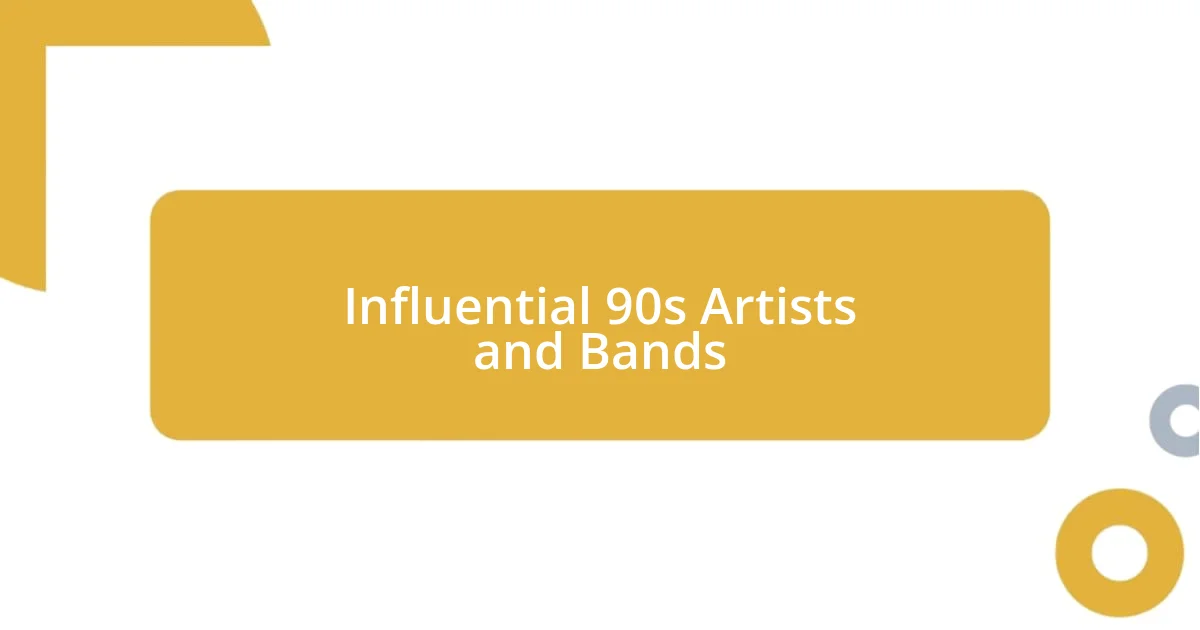
Influential 90s Artists and Bands
The 90s introduced us to some truly remarkable artists and bands that shaped the landscape of music. I still remember the first time I listened to Alanis Morissette’s “You Oughta Know.” The raw emotion in her voice spoke to my teenage angst in a way that felt almost therapeutic. Her unapologetic honesty gave me courage; it was as if she validated all those complicated feelings I couldn’t articulate at the time.
Moving beyond rock and grunge, the influence of artists like TLC can’t be overstated. Their hits weren’t just catchy; they carried strong messages about empowerment and self-love. I recall singing “No Scrubs” at the top of my lungs with friends, feeling like we were part of a movement that encouraged independence. It was powerful to feel that solidarity through music, forging connections that went beyond mere melodies.
In terms of talent and innovation, there’s no way one can overlook the impact of artists like Beck and the way he blended genres. His song “Loser” was an anthem for the misfits, allowing us to embrace our quirks instead of hiding them. By simply being himself, Beck introduced a new kind of artistic freedom that resonates with me even today. Have you ever felt a song articulate your unique experience? I find myself reflecting on those 90s artists as a reminder to keep exploring and celebrating my individuality.
| Artist/Band | Notable Work |
|---|---|
| Nirvana | Smells Like Teen Spirit |
| TLC | No Scrubs |
| Alanis Morissette | You Oughta Know |
| Beck | Loser |
| Tupac | Changes |
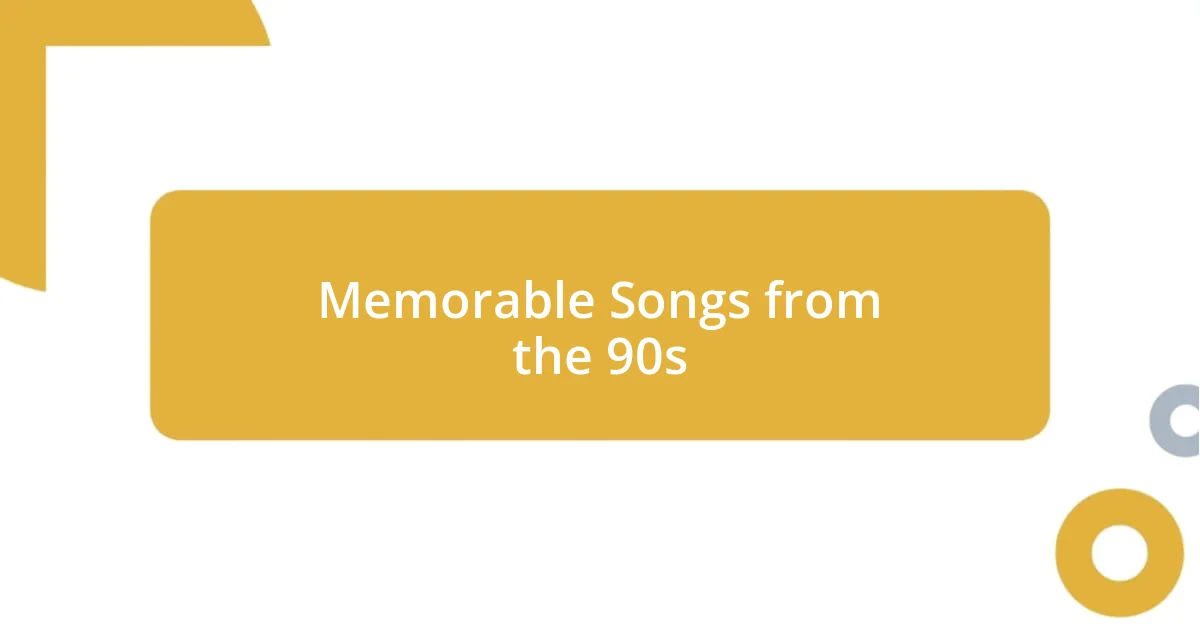
Memorable Songs from the 90s
One song that stands out in my memory is “I Will Always Love You” by Whitney Houston. The first time I heard it on the radio, I was stunned by the power of her voice. It felt like every note wrapped around my heart and squeezed; I can still feel the goosebumps that crawled over my skin during those high notes. It was more than just a love song—it was an anthem that made me believe in the kind of love that transcends time.
Another unforgettable track from the 90s is “Smells Like Teen Spirit” by Nirvana. I vividly remember the first time my older brother played it for me; I was drawn in by the gritty sound that was so different from everything else I’d heard. The angst and rebellion mirrored the confusion I felt as a teenager, prompting me to question not just music, but everything around me. It blew open the doors to grunge music and turned my understanding of what rock could be on its head.
Then there’s “Waterfalls” by TLC, which painted a vivid picture of life’s choices and consequences. Listening to that song took me back to conversations with my friends about relationships and the pressures we faced. I still recall a moment at a high school party when we all gathered to sing it together. The unity we felt in sharing those lyrics felt like a pact, one that reminded us to care for one another amidst the chaos of teenage life. Isn’t it incredible how these songs can forge such profound connections and evoke strong emotions even years later?
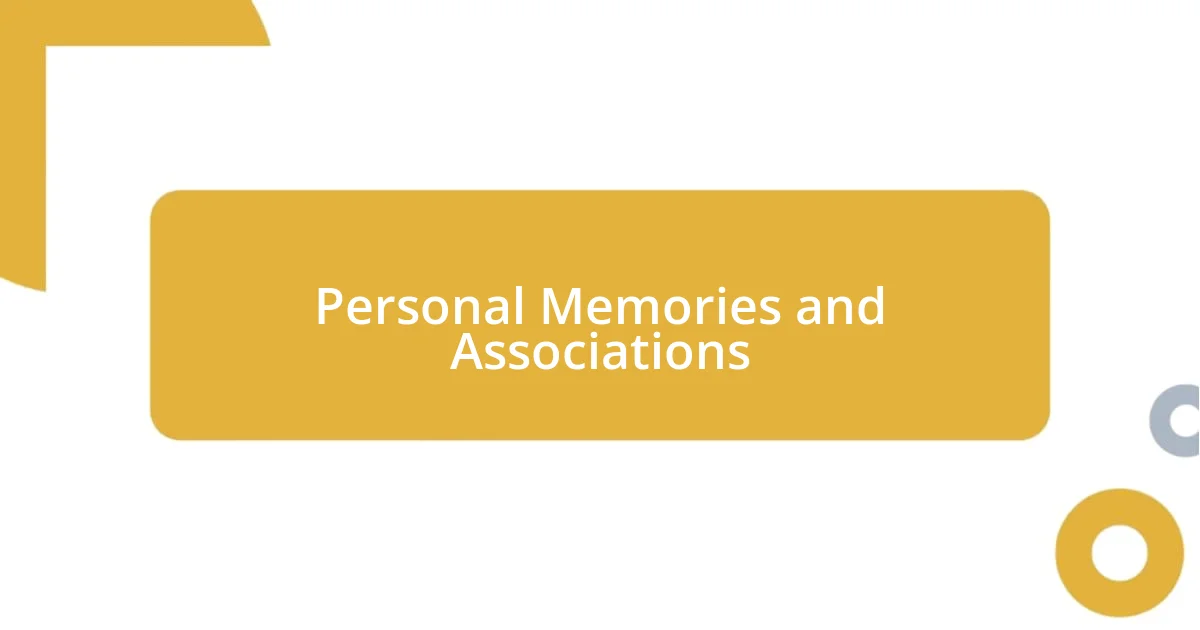
Personal Memories and Associations
I have this vivid memory of driving around with friends, windows down, blasting “No Scrubs” by TLC. It was more than a favorite song; it was our anthem. We used to joke that we were on the lookout for “scrubs” in our own lives, and singing along made us feel empowered while navigating the often-tumultuous waters of young love.
There’s something nostalgic about hearing “I Will Always Love You.” I remember curling up on my bedroom floor, singing into a hairbrush, feeling as if I could match Whitney’s powerful notes—though I absolutely couldn’t! In those moments, I was filled with dreams of love—and perhaps a bit naïve. But isn’t there a certain magic in those misguided beliefs? They reminded me of the strength and vulnerability that come hand-in-hand with growing up and chasing after those idealistic notions.
Every time “Smells Like Teen Spirit” plays, I can’t help but think back to the rebellious spirit that defined my teenage years. I recall wearing flannel shirts long before they were a fashion statement, embracing a grunge aesthetic that felt like a rebellion against conformity. Did you ever feel that rush of freedom when you stepped outside the box? For me, that song wasn’t just an anthem; it was a reminder to embrace my true self, no matter how awkward or out of place I felt.
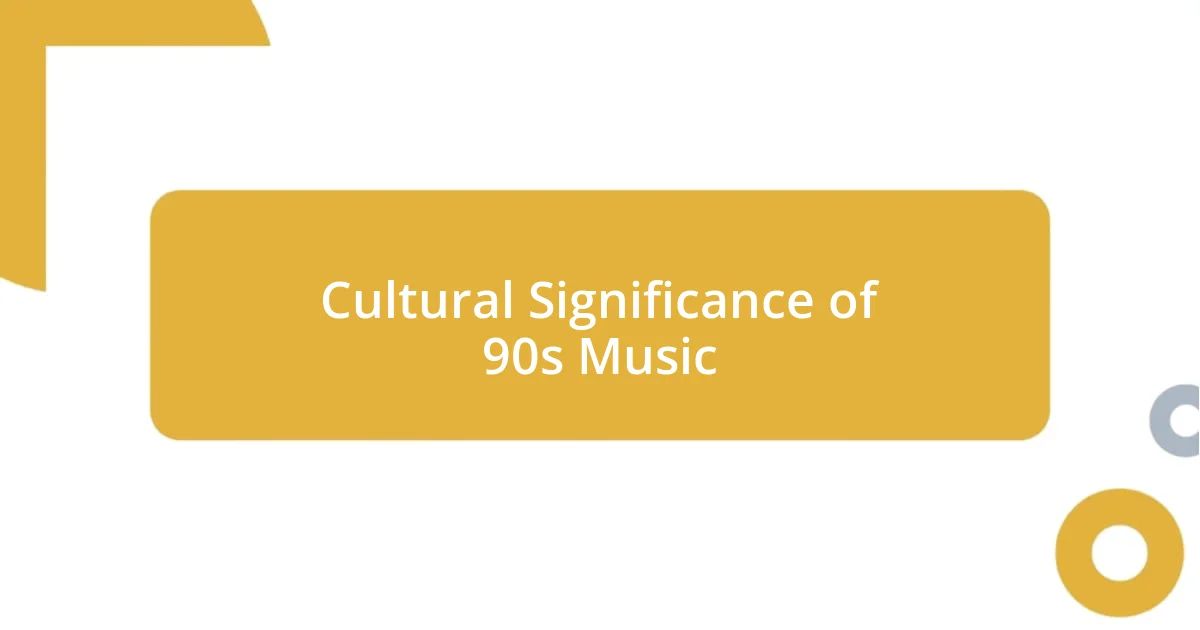
Cultural Significance of 90s Music
Music from the 90s carved out a cultural identity that resonated with millions. The rise of genres like grunge and hip-hop reflected a shift in societal attitudes, sparking conversations about authenticity and expression. I remember feeling the weight of those lyrics; they spoke not just to my experiences but to a generation questioning norms and searching for meaning.
Take, for example, the impact of songs like “No Rain” by Blind Melon. It became a sort of emblem for the outliers and dreamers among us, echoing a universal desire to belong. I often found solace in its melody during those lonelier days. Doesn’t it amaze you how specific songs can encapsulate moments in our lives, turning them into shared memories we carry with us?
Furthermore, the emergence of female empowerment anthems like “Wannabe” by the Spice Girls reflected a pivotal cultural shift. I remember belting out the chorus with my friends, feeling invincible as we embraced the message of friendship and self-worth. Those tunes didn’t just entertain; they ignited a sense of camaraderie and strength, transforming how young women viewed themselves and each other. It’s fascinating how 90s music served as a vehicle for change, shaping our identities and igniting movements that continue to influence today’s culture.
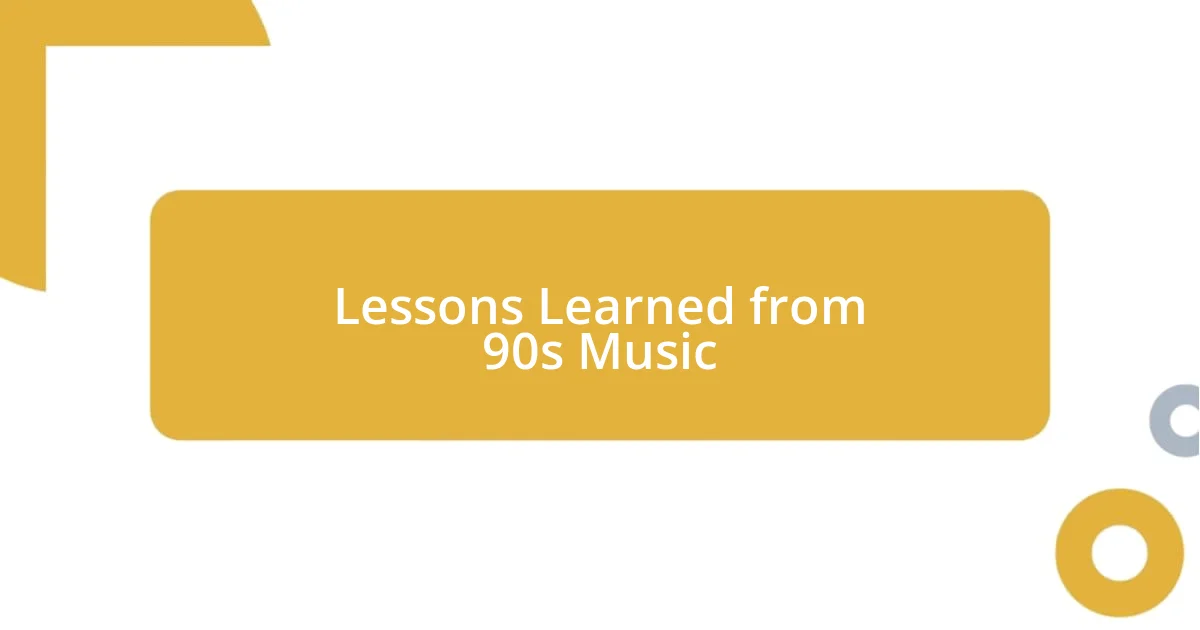
Lessons Learned from 90s Music
The lessons I learned from 90s music revolve primarily around authenticity. Songs like “Black Hole Sun” by Soundgarden made me reflect on the importance of embracing my true emotions, even when they felt dark or overwhelming. Have you ever found solace in a song that just seems to get you? It’s incredible how music becomes a mirror, reflecting our inner struggles while providing a sense of belonging.
Listening to artists like Alanis Morissette taught me the power of vulnerability. Tracks such as “You Oughta Know” were a revelation; they weren’t just about heartbreak, but rather about owning one’s feelings and experiences. I remember blasting that song after a tough breakup, letting the emotions wash over me like a cathartic wave. Why is it that these expressions of pain resonate so deeply? Perhaps it’s because they remind us that we’re never truly alone in our battles.
Moreover, 90s hip-hop, with its diverse narratives, pushed me to appreciate different perspectives. Songs like “Juicy” by The Notorious B.I.G. honestly opened my eyes to the challenges others face and the dreams they strive for. I often think back to those moments when I truly listened to the lyrics, feeling inspired by the resilience conveyed in the storytelling. How powerful it is to share stories that uplift, challenge, and connect us across different backgrounds!
